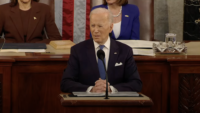As the Biden administration continues to distribute more of the funds from the $1.2-trillion Infrastructure Investment and Jobs Act, one focus is the law's record funding for tribal infrastructure, including roads and bridges, drinking water, wastewater treatment and broadband.
Mitch Landrieu, the White House infrastructure implementation coordinator, told reporters on May 31 that the IIJA contains tribal set-asides totaling more than $13 billion. Landrieu also noted that tribes can apply for “billions of dollars” in other IIJA programs, including competitively awarded grants.
In all, Landrieu said, “This is going to be the largest investment in tribal infrastructure in American history.”
According to a White House fact sheet, the largest IIJA tribal five-year allotment is $3.5 billion for the Indian Health Service (IHS) sanitation facilities construction program. IHS is part of the Health and Human Services Dept.
The statute also provides $3 billion for the Dept. of Transportation's tribal transportation program and $2 billion for the Commerce Dept.'s tribal broadband connectivity program.
Other tribal allocations are $900 million for Environmental Protection Agency Clean Water and Drinking Water grants and $800 million for DOT tribal transportation facility bridges.
Landrieu said, “For too long, infrastructure dollars have not been deployed equitably to Indian country.”
He noted that about 70% of the Bureau of Indian Affairs road system are unpaved and 68% of the system’s bridges are in “acceptable” condition.
Needs are also great in drinking water and internet access, officials said.
Radhika Fox, EPA's assistant administrator for water, said that as part of the IIJA rollout, the agency on Mary 31 issued an “implementation memo” for $868 million for tribal water infrastructure through the Drinking Water and Clean Water State Revolving Fund program.
The memo provides an annual breakdown of the tribal portion of the revolving funds, including $151 million in fiscal 2022.
The document also includes tables showing the 2022 funding split among EPA's 10 regions.
Besides the revolving fund allotments, EPA also announced $2.6 million for tribes to deal with “emerging contaminants,” such as pharmaceuticals.
Andrea Palm, HHS deputy secretary, said that a 2015 Indian Health Service study showed there are about $3.4 billion in Indian country water and sewer needs,
Palm said the IIJA's $3.5 billion over five years for the Indian Health Service “will address the backlog of projects on the IHS sanitation facilities lists.
She added, “This means that many tribal communities will no longer have to put up with bursting pipes, water shut-off [and] boil-water notices."
HHS on May 31 also announced the allocations for the $700-million fiscal 2022 portion of the $3.5 billion.
In addition, the White House released a "playbook" to help tribes navigate the processes for seeking the various types of IIJA funds.





